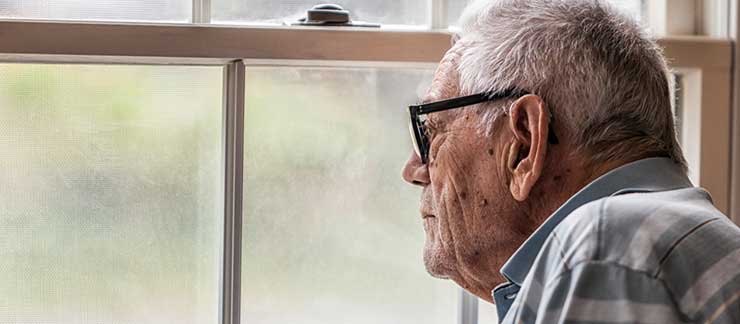
The Social Fallout From Falling
An older adult falls every second of every day, according to the Centers for Disease Control. The likelihood of a fall increases with age, up to 37 percent in people 85 years or older. So, it’s common to experience the fall of an elderly loved one. But what happensafter the fall can dramatically impact your loved one’s recovery.
In the aftermath, the daily life of the senior involves new priorities: healing and recovering, occupational therapy, physical therapy and doctor’s appointments. Meantime, the recovery process limits positive social interactions. Don’t let loneliness and loss of confidence creep into your senior’s life. These negative consequences are damaging to recovery.
Companionship is Critical
After the fall, your elderly loved one may be confined to the house for an extended period. When your senior feels lonely, companionship becomes critical. For example, Sheila had been walking her dog before slipping on snowy pavement. She underwent hip replacement surgery, a procedure that required extensive occupational and physical therapy afterward. Sheila had to give her dog away to a neighbor because she could no longer walk very well. The irony was that she had gotten the dog to keep her company.
Sheila said it felt like a “prison” to be confined first to the hospital bed and then to a wheelchair. When she finally returned home, she adjusted to walking with a cane. But her left leg muscles remained weak. So her daily activities were vastly diminished. When she first came home, she endured not being able to shower or bathe. Sheila felt uncomfortable and demoralized in her own skin. Even though she wanted to socialize, she didn’t want people to see her without proper grooming. Discomfort and isolation left her feeling anxious and moody. The family finally decided to hire a professional caregiver for Shiela, who visits to help with bathing. It has made a world of a difference because this person is now a companion who she is eager to see.
Sheila misses other parts of her former routine. “I used to go the beauty parlor [every week]. I don’t do those things anymore,” she said about getting her hair and nails done regularly. Instead, she relies on the availability and kindness of her sister to drive her places. But she doesn’t want to be a burden. So she compensates by rushing through errands. For instance, recently Sheila said she forgot to pick up coffee on a run to the grocery store with her sister. Now, she has to wait a few more days in hopes of catching another opportunity to go shopping again.
Under a different circumstance, Sheila would not have to feel rushed. A professional caregiver can restore a semblance of autonomy by serving as a regular driver and grocery companion. Meanwhile, Sheila would get the social interaction she craves while slowly recovering. “I didn’t know the recovery was such a long process,” said Sheila. “My left leg hurts me, and I really don’t want to have a limp for the rest of my life.”
Loneliness Can Be Dangerous
The social well-being of the elderly is critical to healthier outcomes, according to an NPR article: “Research shows older adults who feel lonely are at greater risk of memory loss, strokes, heart disease and high blood pressure.”
While your senior is on the mend, it’s important not to further put his or her health at risk. A professional caregiver can serve as the buffer against mental and emotional decline.
“There’s a big difference when there’s somebody in the house,” said Sheila. “If you are watching the movie, you can say ‘Oh, this is a good movie.’”
Kindness, patience and friendship. The bond between the elderly and the professional caregiver can be highly satisfying. Social feedback keeps the senior's brain stimulated and alert. And your elderly loved one is less prone to loneliness, anxiety and negative thoughts.
Reducing the Fear of Falling
After the traumatic experience of a fall, it’s common for your senior to be fixated on the negative—fear of falling. The fear is so intense that it can leave them unwilling to venture beyond the home and even increase the likelihood of another fall. According to the medical article in Gait and Posture: "Many people who fall, even if they're not injured, become afraid of falling. This fear may cause a person to cut down on their everyday activities. When a person is less active, they become weaker, and this increases their chances of falling." The fear will induce stiffened body movements and hinder recovery to natural body movements.
Dick recalls the rapid decline of his father, who endured multiple falls. Claire was in his 80s when he first fell in his multi-storied house. The fall led to hip surgery. Claire tried to recover in the home, but it became clear, he needed to enter an assisted living center. Unfortunately, at the living center, Claire fell again while in a wheelchair. He fell one more time after his health rapidly declined and entered a nursing home. He remained confined to the wheelchair and bed at the end of his life.
But with a professional, Claire may have been able to age in place at home with the help of a professional caregiver. They are trained to prevent falls and motivate your elderly loved one to focus on recovery. By fall-proofing your loved ones home, which the right home care provider will help you accomplish, you can dramatically reduce your senior’s chances of falling. In turn, they’ll be mobile without risk of falling, and their confidence will hopefully increase alongside their mobility.
For more information on fall-proofing your loved one’s home, click here.
